-
Starvation is only one crop breeding cycle away
Global population growth, urbanization, and a changing climate mean staple food crops will need to achieve much higher yields in the near future. New research proposes genetic engineering solutions to improve photosynthetic efficiency of food crops, boosting yield under higher temperatures and carbon dioxide levels. Because it can take twenty to thirty years of breeding and product development efforts before new crops are available to farmers, those efforts must start now.
-
-
New biotechnology improves crop performance
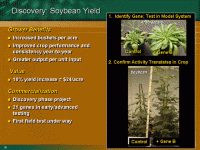
With the world’s population exploding to well over seven billion, feeding the human race is getting even more challenging. Increasing the yield from crops such as wheat, maize, rice and barley, is paramount to growing enough food. In addition, crop production is now affected by stressors such as drought, climate change, and the salinization of fields — presenting obstacles to our future food supply. Rsearchers have discovered a way to enhance a plant’s tolerance to stress, which in turn improves how it uses water and nutrients from the soil. These improvements increase plant biomass and yield.
-
-
Global warming increases rainfall in world's driest areas
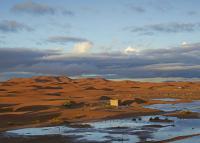
Global warming will increase rainfall in some of the world’s driest areas over land, with not only the wet getting wetter but the dry getting wetter as well — a phenomenon that could lead to more flash flooding.
-
-
Impact of climate change on agriculture may be underestimated
Studies of how climate change might affect agriculture generally look only at crop yields — the amount of product harvested from a given unit of land. But climate change may also influence how much land people choose to farm and the number of crops they plant each growing season. A new study takes all of these variables into account, and suggests researchers may be underestimating the total effect of climate change on the world’s food supply.
-
-
Syria’s 1998-2012 drought likely its most severe in more than 900 years
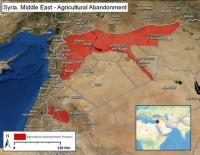
In the years before the Syrian conflict erupted, the region’s worst drought on record set in across the Levant, destroying crops and restricting water supplies in the already water-stressed region. A new study shows that that drought, from 1998 to 2012, was not just the most severe in a century of record-keeping — it was the Levant’s most severe drought in at least 500 years and likely more than 900 years.
-
-
Resources used for biofuel reduce resources available for food production
As strategies for energy security, investment opportunities and energy policies prompt ever-growing production and consumption of biofuels like bioethanol and biodiesel, land, and water that could otherwise be used for food production increasingly are used to produce crops for fuel. A new study shows about a third of the world’s malnourished population could be fed by using resources now used for biofuel production.
-
-
Climate change impact on food production could cause 500,000 extra deaths in 2050
Climate change could kill more than 500,000 adults in 2050 worldwide due to changes in diets and bodyweight from reduced crop productivity. The research, published yesterday in The Lancet, is the strongest evidence yet that climate change could have damaging consequences for food production and health worldwide. The study found that by 2050, reduced fruit and vegetable intake could cause twice as many deaths as under-nutrition, and that three-quarters of all climate-related deaths due to changes in food production are estimated to occur in China and India.
-
-
Integrating markets to offset climate-related food insecurity
Global market integration is key to buffering future commodity prices and food security from the negative effects of climate change on agriculture. Rising temperatures and an increase in extreme weather events will likely have adverse impacts on global crop production, leading to higher food prices and food scarcity. But global markets that have the ability to deliver food where it is needed most could help offset these consequences.
-
-
Extreme weather likely to result in “food shocks”
A panel of British and American researchers, speaking at the annual meeting of the American Association for the Advancement of Science (AAAS) in Washington, D.C., presented updated research revealing how extreme events which affect the food system are increasingly likely to occur, resulting in “food shocks.”
-
-
Food for billions: Inland fisheries and global food security
Inland capture fisheries are much more crucial to global food security than realized, according to the first global review of the value of inland fish and fisheries. The review shows that although aquaculture and inland capture fisheries contribute more than 40 percent of the world’s reported finfish production, their harvest is greatly under-reported and value is often-ignored. Topping the list of the value of inland fish and fisheries is food and economic security: these fisheries provide food for billions of people and livelihoods for millions worldwide. They are a primary animal protein consumed by many of the world’s rural poor, especially those in developing countries.
-
-
Nurturing the future of agriculture
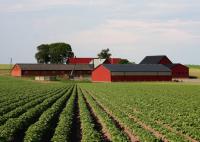
Climate change and man-made events put global food security at risk. But researching how plants produce seeds and evolve could help us find new ways to ensure food security. For the first time in its history, the Global Seed Vault on the Svalbard Islands, Norway, has authorized a withdrawal. It was requested in 2015 by Syria, a country where the war is endangering the local agricultural seed collections.
-
-
Severe drought no longer caused just by nature
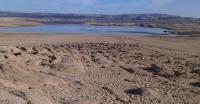
Scientists are calling on drought researchers and managers around the world to consider both human activity and natural phenomena in their battle to preserve increasingly scarce global water supplies. The experts say that severe droughts experienced recently in countries such as China, Brazil and the United States can no longer be seen as purely natural hazards. Changes to the way people use the water and the landscape contribute to extreme water shortages.
-
-
New plant growth technology may alleviate climate change, food shortage
A research team has developed a new strategy to promote plant growth and seed yield by 38 percent to 57 percent in a model plant Arabidopsis thaliana, hence increasing CO2 absorption from the atmosphere. This technology may also have potential in boosting food production and thus could solve another danger of human civilization: food shortage due to overpopulation.
-
-
Drought, heat deleterious for global crops
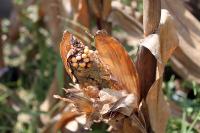
Drought and extreme heat slashed global cereal harvests between 1964 and 2007 — and the impact of these weather disasters was greatest in North America, Europe, and Australasia. At a time when global warming is projected to produce more extreme weather, a new study provides the most comprehensive look yet at the influence of such events on crop area, yields, and production around the world.
-
-
Global reductions in mercury emissions should lead to billions in economic benefits for U.S.
Mercury pollution is a global problem with local consequences: Emissions from coal-fired power plants and other sources travel around the world through the atmosphere, eventually settling in oceans and waterways, where the pollutant gradually accumulates in fish. Consumption of mercury-contaminated seafood leads to increased risk for cardiovascular disease and cognitive impairments. A new study reports that global action on reducing mercury emissions will lead to twice the economic benefits for the United States, compared with domestic action, by 2050. However, those in the United States who consume locally caught freshwater fish, rather than seafood from the global market, will benefit more from domestic rather than international mercury regulations.
-
- All
- Regional
- Water
- Biometrics
- Borders/Immig
- Business
- Cybersecurity
- Detection
- Disasters
- Government
- Infrastructure
- International
- Public health
- Public Safety
- Communication interoperabillity
- Emergency services
- Emergency medical services
- Fire
- First response
- IEDs
- Law Enforcement
- Law Enforcement Technology
- Military technology
- Nonlethal weapons
- Nuclear weapons
- Personal protection equipment
- Police
- Notification /alert systems
- Situational awareness
- Weapons systems
- Sci-Tech
- Sector Reports
- Surveillance
- Transportation
Advertising & Marketing: advertise@newswirepubs.com
Editorial: editor@newswirepubs.com
General: info@newswirepubs.com
2010-2011 © News Wire Publications, LLC News Wire Publications, LLC
220 Old Country Road | Suite 200 | Mineola | New York | 11501
Permissions and Policies
Editorial: editor@newswirepubs.com
General: info@newswirepubs.com
2010-2011 © News Wire Publications, LLC News Wire Publications, LLC
220 Old Country Road | Suite 200 | Mineola | New York | 11501
Permissions and Policies
